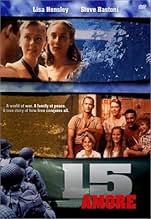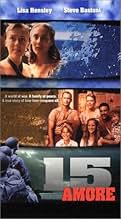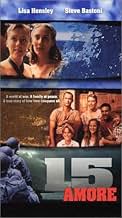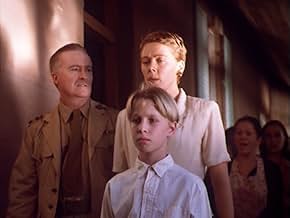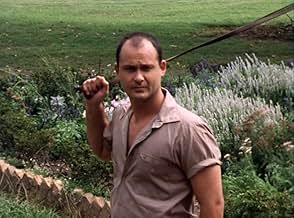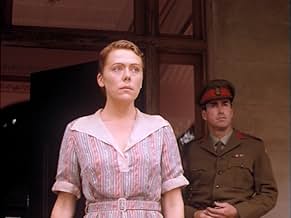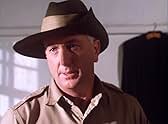Peace within war. An adult voice narrates a story of childhood during World War II.Peace within war. An adult voice narrates a story of childhood during World War II.Peace within war. An adult voice narrates a story of childhood during World War II.
- Awards
- 3 wins & 7 nominations
Genevieve Clay-Smith
- Nancy Cakebread
- (as Genevieve Clay)
Bill Hunter
- Brendan's Voice
- (voice)
- Director
- Writer
- All cast & crew
- Production, box office & more at IMDbPro
Storyline
Did you know
- TriviaWhen filming the scene in the river where Brendan almost drowns and then spits out a tadpole, real live tadpoles were used. In one take, Nic Bryant accidentally swallowed a tadpole and was sick for the next two days.
- GoofsBoom mic drops into shot when the soldiers come to visit the prisoners of war.
- ConnectionsReferences Gone with the Wind (1939)
Featured review
There's some things to like about this film, especially the beautiful sets and the photography. It's a wonderful idea (true story?), too, bringing together the main players who have all lost something in an oasis of calm outside the raging global war.
We are presented, in part, with a lilting, lyrical depiction of this little paradise that provides safe haven to them all. The photography gives us golden light and sweeping movements, landscape and close-ups of insects to show the "oneness" and interconnectedness of it all, reinforced by a romantic score.
Unfortunately, the jerky, episodic vignettes that are supposed to set the scene and the clunky dialogue provide many jarring moments. The film gradually descends into Mills & Boon romantic schlock, whether it's Steve Bastoni's Alfredo grindingly and palpably resisting temptation with Lisa Hensley's Dorothy, or Joseph and Rachel (played by Domenic Galati and Tara Jakszewicz) engaging in somehow unbelievable carnal acts in the pine needles (do they really cause a rash?).
With the exception of Steve Bastoni and Domenic Galati, the performances were distinctly unconvincing. Lisa Hensley has obvious trouble striking a balance between her character's earth mother approach to all the creatures in her care and the "British" reserve that is clearly supposed to contrast with the passionate Italians and the bitter German in the form of Madame Gutman (why Madame if she's German?). The end result is that she just sounds constipated. And I can't believe that I read a review that claims that the film doesn't fall into the trap of characters representing national stereotypes! Are we talking about the same film?
As for Rachel's German accent...........
The climactic seen where Madame Gutman denounces Alfredo and Joseph to the ineptly played military police is just pure soap, confused and utterly adrift. Silly, in fact.
Maybe the simplistic depiction of the characters and events was meant to represent the narrator's childish recollections, but that fails to explain how the child was able to accurately know or observe the emotional trauma and struggles that his characters were going through.
As I said, a nice idea and often pretty to watch but, on the whole, clunky and jarring.
We are presented, in part, with a lilting, lyrical depiction of this little paradise that provides safe haven to them all. The photography gives us golden light and sweeping movements, landscape and close-ups of insects to show the "oneness" and interconnectedness of it all, reinforced by a romantic score.
Unfortunately, the jerky, episodic vignettes that are supposed to set the scene and the clunky dialogue provide many jarring moments. The film gradually descends into Mills & Boon romantic schlock, whether it's Steve Bastoni's Alfredo grindingly and palpably resisting temptation with Lisa Hensley's Dorothy, or Joseph and Rachel (played by Domenic Galati and Tara Jakszewicz) engaging in somehow unbelievable carnal acts in the pine needles (do they really cause a rash?).
With the exception of Steve Bastoni and Domenic Galati, the performances were distinctly unconvincing. Lisa Hensley has obvious trouble striking a balance between her character's earth mother approach to all the creatures in her care and the "British" reserve that is clearly supposed to contrast with the passionate Italians and the bitter German in the form of Madame Gutman (why Madame if she's German?). The end result is that she just sounds constipated. And I can't believe that I read a review that claims that the film doesn't fall into the trap of characters representing national stereotypes! Are we talking about the same film?
As for Rachel's German accent...........
The climactic seen where Madame Gutman denounces Alfredo and Joseph to the ineptly played military police is just pure soap, confused and utterly adrift. Silly, in fact.
Maybe the simplistic depiction of the characters and events was meant to represent the narrator's childish recollections, but that fails to explain how the child was able to accurately know or observe the emotional trauma and struggles that his characters were going through.
As I said, a nice idea and often pretty to watch but, on the whole, clunky and jarring.
Details
- Release date
- Country of origin
- Official site
- Language
- Also known as
- Amores de Guerra
- Filming locations
- See more company credits at IMDbPro
- Runtime1 hour 32 minutes
- Color
Contribute to this page
Suggest an edit or add missing content




